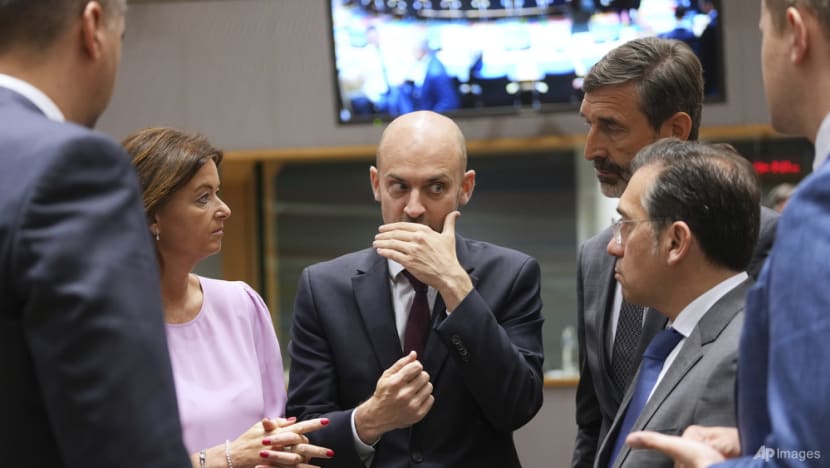Iran, European powers hold first direct nuclear talks since airstrikes as UN deadline nears

French Foreign Minister Jean-Noel Barrot, center, speaks with from left, Malta's Foreign Minister Ian Borg, Slovenia's Foreign Minister Tanja Fajon, Slovakia's Foreign Minister Juraj Blanar and Spain's Foreign Minister Jose Manuel Albares Bueno during a meeting of EU foreign ministers at the European Council building in Brussels, Monday, June 23, 2025. (Photo: AP/Virginia Mayo)
ISTANBUL: Iran and European powers held “serious, frank, and detailed” talks on Friday (Jul 25) over Tehran’s nuclear programme, as both sides seek to avoid a lapse of UN sanctions that could be automatically reimposed in October.
The meeting in Istanbul marked the first direct contact between Iranian officials and Western diplomats since last month’s Israeli and US airstrikes on Iran. It lasted about four hours at Iran’s consulate and was attended by representatives from the European Union and the E3 group: France, Britain, and Germany.
IRAN AND EUROPE EXCHANGE PROPOSALS
Iranian Deputy Foreign Minister Kazem Gharibabadi said both sides presented specific ideas relating to nuclear inspections and sanctions relief.
“While seriously criticising their stances regarding the recent war of aggression against our people, we explained our principled positions, including on the so-called snapback mechanism,” he said. “It was agreed that consultations on this matter will continue.”
The E3 nations, along with China and Russia, remain parties to the 2015 nuclear deal from which the United States withdrew in 2018. That agreement had lifted international sanctions on Iran in exchange for curbs on its nuclear activities.
SANCTIONS DEADLINE LOOMING
The talks focused on the expiry of United Nations Security Council Resolution 2231, which underpins the 2015 nuclear deal and is due to lapse on Oct 18.
If no action is taken by then, all UN sanctions on Iran will be lifted. However, the E3 could trigger the “snapback” mechanism at least 30 days before that date, reimposing sanctions on sectors including energy, banking, and defence.
To allow time for this process, European diplomats have set the end of August as a soft deadline to determine whether diplomacy with Iran can be revived. Officials say Tehran would need to make clear commitments, including eventual talks with Washington, renewed cooperation with the UN nuclear watchdog, and accounting for roughly 400 kg of near-weapons-grade uranium reportedly unaccounted for since last month’s strikes.
IRAN RESISTS PRESSURE TO EXTEND UN RESOLUTION
Tehran has resisted the idea of extending Resolution 2231. A foreign ministry spokesperson called such suggestions “meaningless and baseless” prior to the Istanbul meeting.
Nevertheless, International Atomic Energy Agency (IAEA) Director General Rafael Grossi expressed cautious optimism. Speaking in Singapore, he said inspection visits could resume this year if technical arrangements are made.
“We need to agree on where to go, how to do it. We need to listen to Iran in terms of what they consider should be the precautions to be taken,” Grossi said.
US STRIKES AND NUCLEAR FACILITIES
The United States carried out five rounds of talks with Iran prior to June’s military action, which President Donald Trump said had “obliterated” Iran’s alleged nuclear weapons ambitions.
While Tehran maintains its programme is strictly civilian, NBC News has reported that a US intelligence review concluded that only one of the three targeted sites was heavily damaged, while the other two suffered less extensive harm.
Iran has consistently denied it seeks to build a nuclear weapon.














